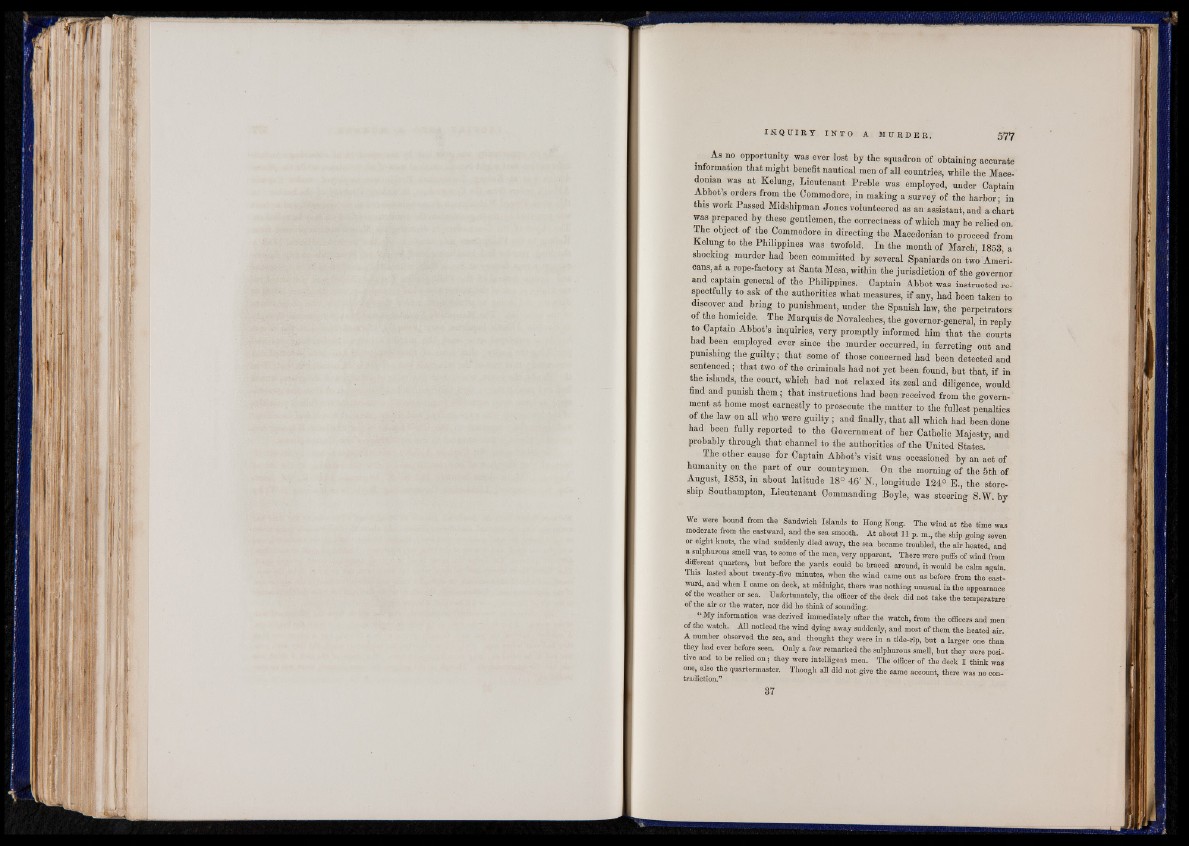
Ill rtf!
I i
I
I I
i l l !
IB f t *
i n ,
IN Q U IB Y I N T O A MU H D E E . 577
As no opportunity was ever lost by the squadron of obtaining accurate
information that might benefit nautical men of all countries, while the Macedonian
was at Kelung, Lieutenant Preble was employed, under Captain
Abbot s orders from the Commodore, in making a survey of the harbor- in
this work Passed Midshipman Jones volunteered as an assistant, and a chart
was prepared by these gentlemen, the correctness of which may be relied on.
The object of the Commodore in directing the Macedonian to proceed from
Kelung to the Philippines was twofold. In the month of March 1853 a
shocking murder had been committed by several Spaniards on two Americans,
at a rope-factory at Santa Mesa, within the jurisdiction of the governor
and captain general of the Philippines. Captain Abbot was instructed respectfully
to ask of the authorities what measures, if any, had been taken to
discover and bring to punishment, under the Spanish law, the perpetrators
of the homicide. The Marquis de Novaleches, the governor-general, in reply
to Captain Abbot’s inquiries, very promptly informed him that the courts
had been employed ever since the murder occurred, in ferreting out and
punishing the guilty; that some of those concerned had been detected and
sentenced; that two of the criminals had not yet been found, but that, if in
the islands, the court, which had not relaxed its zeal and diligence, would
find and punish them; that instructions had been received from the government
at home most earnestly to prosecute the matter to the fullest penalties
of the law on all who were guilty ; and finally, that all which had been done
had been fully reported to the Government of her Catholic Majesty, and
probably through that channel to the authorities of the United States.
The other cause for Captain Abbot’s visit was occasioned by an act of
humanity on the part of our countrymen. On the morning of the 5th of
August, 1853, in about latitude 18° 46' N., longitude 124° E., the store-
ship Southampton, Lieutenant Commanding Boyle, was steering S.W. by
We were bound from the Sandwich Islands to Hong Kong. The wind at the time was
moderate from the eastward, and the sea smooth. At abont H p. m., the ship going seven
or eight knots, the wind suddenly died away, the sea became troubled, the air heated, and
a sulphurous smell was, to some of the men, very apparent. There were puffs of wind from
different quarter^ but before the yards could be braced around, it would be calm avain.
This lasted about twenty-five minutes, when the wind came out as before from the eastward,
and when I came on deck, at midnight, there was nothing unusual in the appearance
of the weather or sea. Unfortunately, the officer of the deck did not take the temperature
of the air or the water, nor did he think of sounding.
“ My information was derived immediately after the watch, from the officers and men
of the watch. All noticed the wind dying away suddenly, and most of them the heated air.
A number observed the sea, and thought they were in a tide-rip, but a larger one than
they had ever before seen. Only a few remarked the sulphurous smell, but they were positive
and to be relied on ; they were intelligent men. The offioer of the deck I think was
one, also the quartermaster. Though all did not give the same account, there was no con-
tradiction.”
37